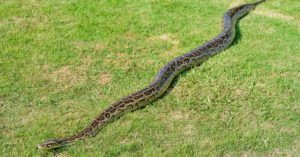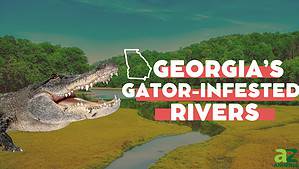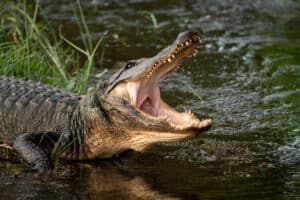Key Points:
- Each year, South Carolina issues around 1,000 alligator tags. Because the demand for these tags is so high, there is a yearly lottery to determine who will get one.
- South Carolina is broken into four hunting zones, in which 13-foot gators have been caught.
- The largest alligator ever found in South Carolina was 13 feet 6 inches and weighed 1,025 pounds, caught in 2010 by Maryellen Mara-Christian of Fitchburg, Massachusetts.
Alligators live in the southeastern U.S. in Texas, Mississippi, Alabama, Georgia, Florida, South Carolina, and parts of North Carolina. These large reptiles make themselves at home in swamps, marshes, ponds, rivers, lakes, and sometimes golf courses!
An average adult male alligator is 10-12 feet long and weighs 400-500 pounds. Females are closer to 8 feet long and around 200 pounds. But how big was the biggest alligator ever found in South Carolina? Let’s find out!
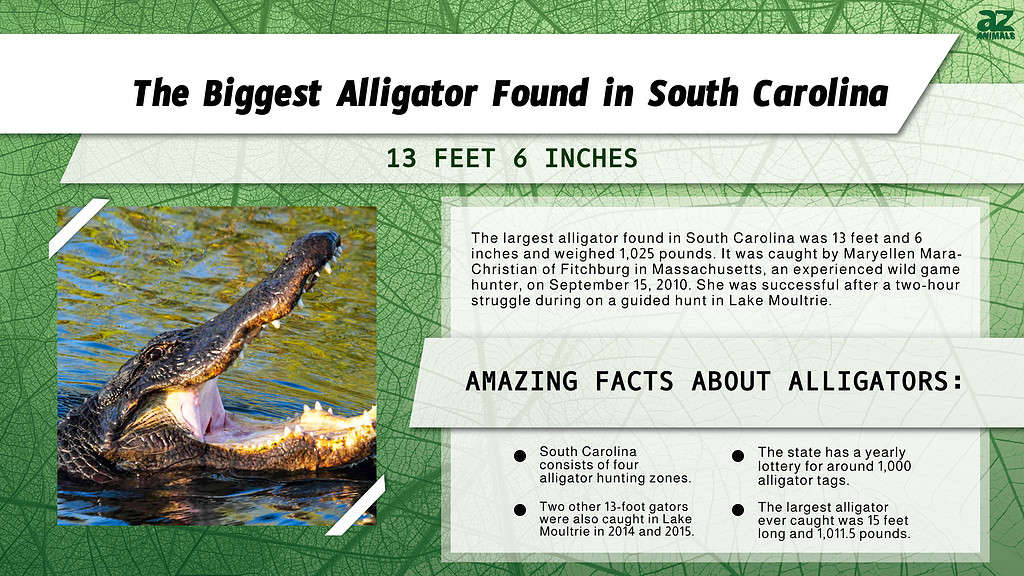
How Big Was the Biggest Alligator Ever Found in South Carolina?
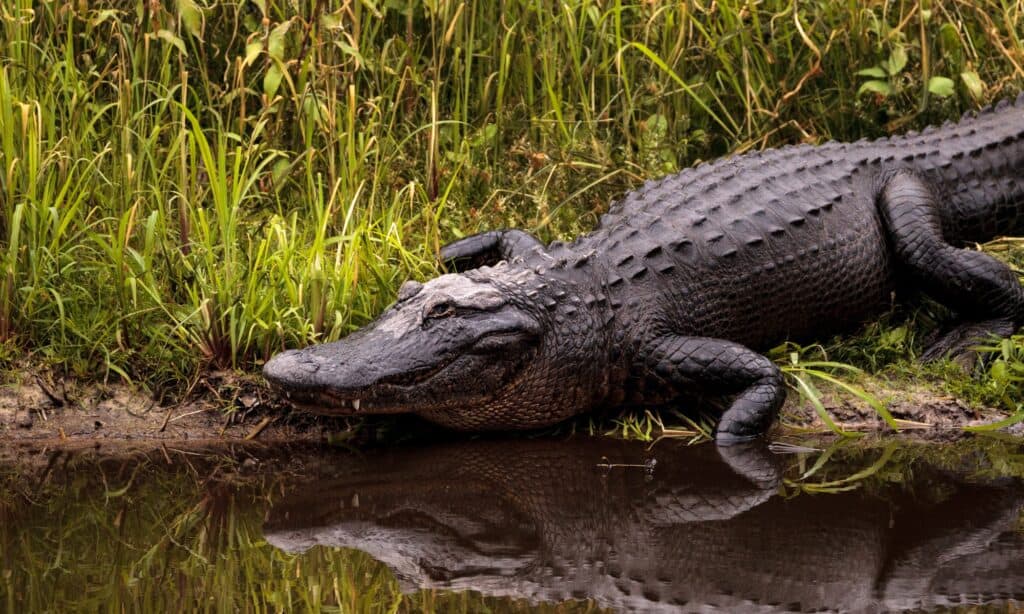
Some of the biggest gators in South Carolina inhabit Lake Moultrie.
©iStock.com/LagunaticPhoto
The biggest alligator ever found in South Carolina was 13 feet 6 inches and weighed 1,025 pounds! It was caught by Maryellen Mara-Christian of Fitchburg, Mass., an experienced wild game hunter. Maryellen and her husband, Mark, found this monster on a guided hunt in Lake Moultrie, one of the lakes known today to have some of the biggest gators in the state. On September 15, 2010, they located the massive gator and, after a two-hour struggle, were able to kill it and bring it in. They got 40 pounds of edible meat from the gator and left the body with a taxidermist to display this remarkable catch.
Who Can Hunt Alligators in South Carolina?
Each year, South Carolina issues around 1,000 alligator tags. Because the demand for these tags is so high, there is a yearly lottery to determine who will get one. You must be 16 years of age or older, and they allow resident and non-resident applicants. If chosen, you need to have a South Carolina hunting license. The South Carolina Department of Natural Resources runs the alligator hunting program, and they monitor the number of alligators in each zone. South Carolina consists of four hunting zones, plus an area in the northwest part of the state where there is no hunting season. Let’s look at some of the biggest alligators ever found in each zone.
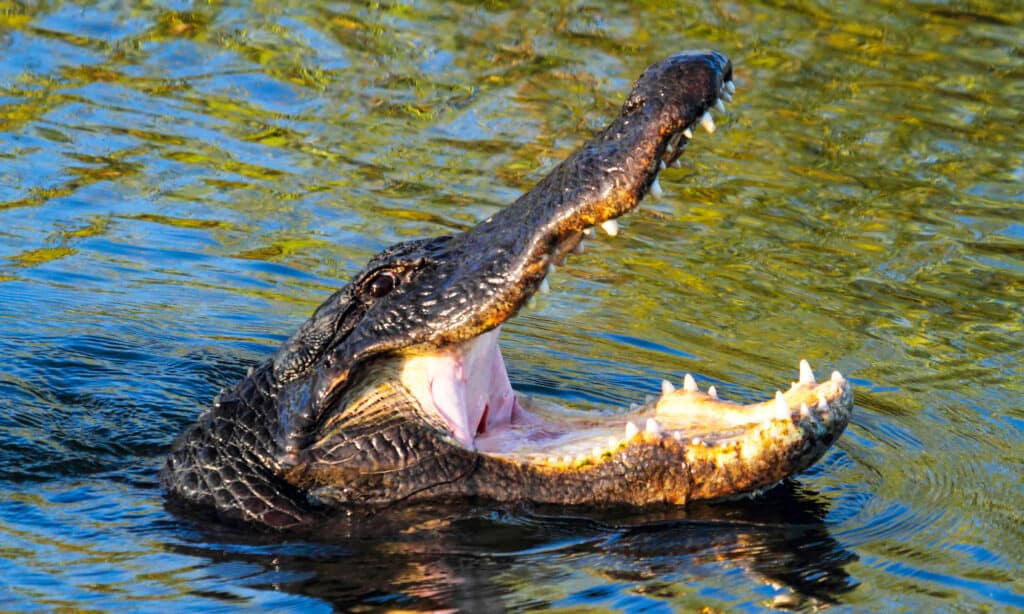
Alligators have a bite force close to 2,125 pounds per square inch!
©Steve Byland/Shutterstock.com
Biggest Alligators in Each Hunting Zone in South Carolina
Biggest Alligators Found in Zone 1 (Southwest, near Hilton Head Island)
Zone 1 is in the southwest corner of South Carolina and includes Hilton Head Island. In fact, one of the largest alligators in this zone was caught near there. In 2015, a 13-foot-1-inch gator was caught in the Combahee River, which is just north of St. Helena Island, just off the coast of the Atlantic. This area has many tributaries that create the highly desired brackish waters in that alligators thrive.
Biggest Alligators in Zone 2 (Central Coastal Area, includes Charleston and Lake Moultrie)
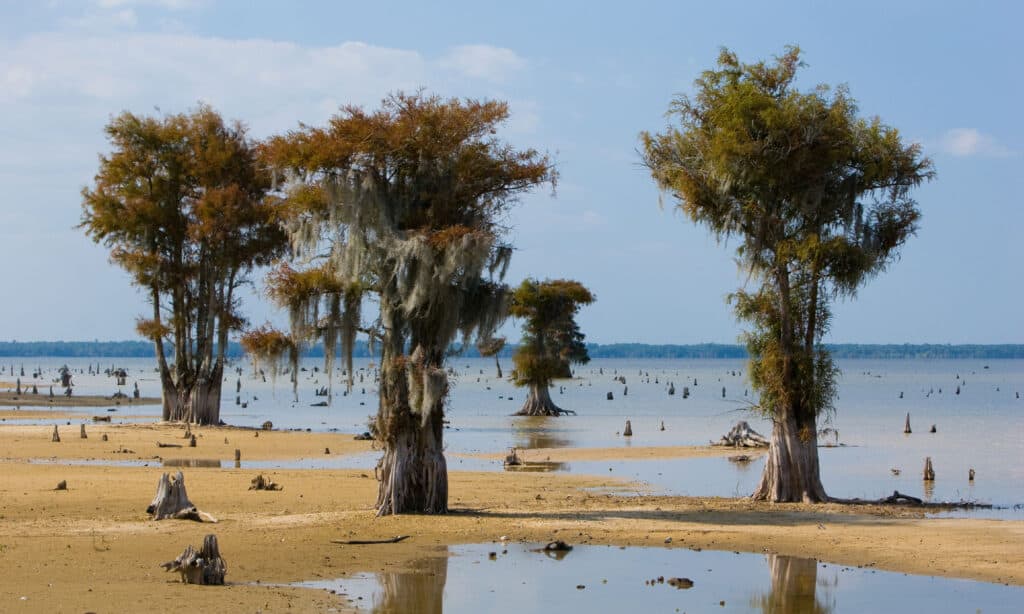
The 60,400-acre Lake Moultrie is the third-largest lake in South Carolina.
©iStock.com/brianjhudson
Zone 2 includes Lake Moultrie, which is where the biggest alligator ever found in South Carolina was caught. There are two more 13-footers on record from Lake Moultrie and another 13-footer from the Ashley River, which is northwest of Charleston.
- 13 feet 2 inches, 762 lbs, Lake Moultrie (2014)
- 13 feet 7.5 inches, 762 lbs, Lake Moultrie (2015)
- 13 feet 4 inches, 604 lbs, Ashley River (2016).
Biggest Alligators in Zone 3 (Central South Carolina, Includes Columbia)
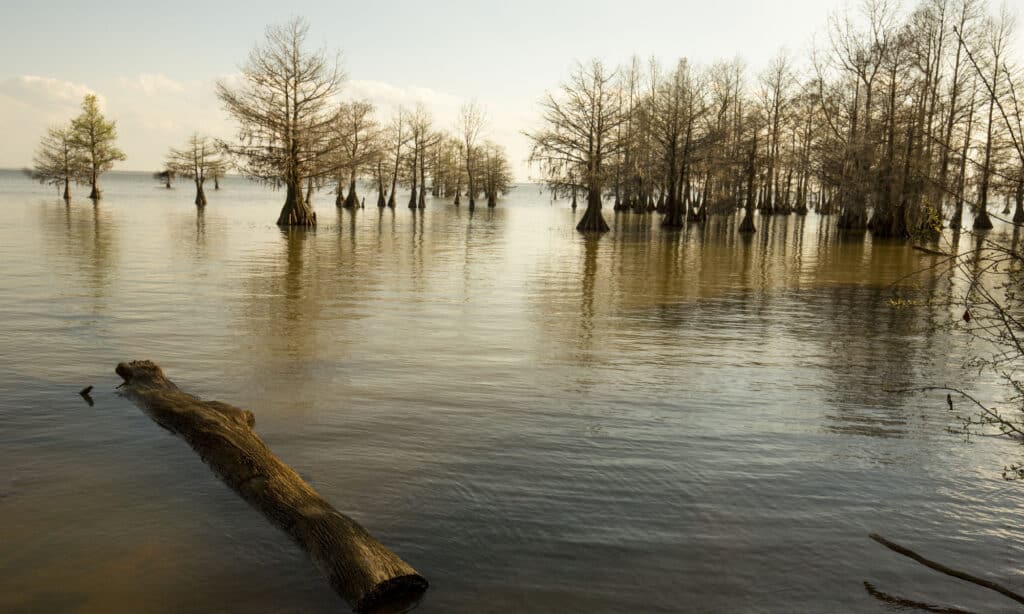
Lake Marion is the biggest lake in South Carolina, with 110,600 acres.
©Jeff Holcombe/Shutterstock.com
All of the biggest gators in Zone 3 were in Lake Marion, which is just north of Lake Moultrie and connected by a waterway. You can imagine it is common for alligators to move between the two lakes during mating season. Here are four of the biggest alligators in Zone 3:
- 13 feet 3 inches, weight unknown, Lake Marion (2014)
- 13 feet 6 inches, 713 lbs., Lake Marion (2014)
- 13 feet 5 inches, 756 lbs., Lake Marion (2015)
- 13 feet 4 inches, weight unknown, Lake Marion (2016).
Biggest Alligators in Zone 4 (Northeast Area, Includes Myrtle Beach)
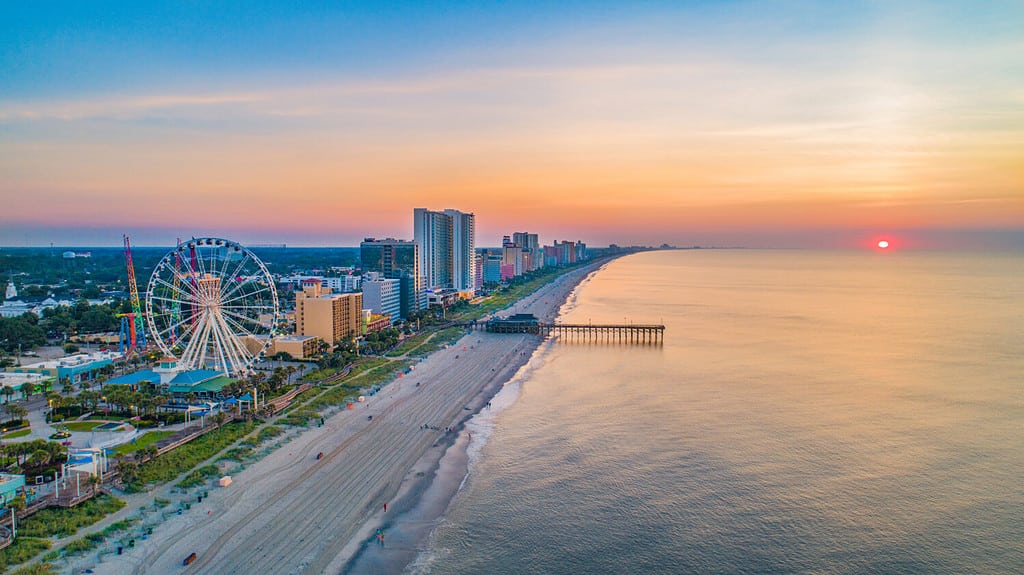
South Carolina’s Zone 4 includes tourist destination Myrtle Beach.
©Kevin Ruck/Shutterstock.com
The biggest alligator found in Zone 4 was a 13-foot 5-inch gator that weighed 800 pounds, pulled from the Waccamaw River near Sand Hole Creek. This river is just northwest of Myrtle Beach. Captain Landon McDowell knew he had found a big one when after a couple of hours of fighting it, he called for a bigger boat. He told ABC 15 News that he had killed 10- and 12-footers before, but he knew this one was bigger than that, and he was right. He had the head mounted as a trophy and had the rest of the alligator processed for meat.
What Is the Biggest Alligator Ever in the World?
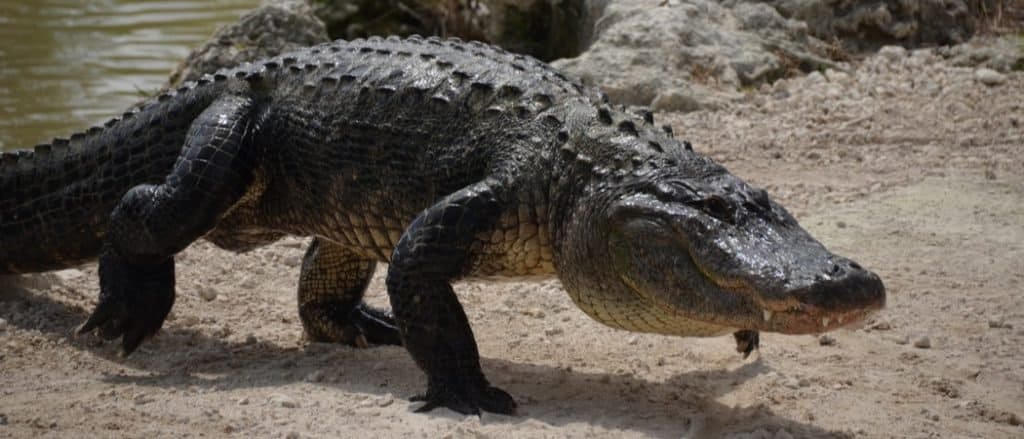
The biggest alligator on record was 15 feet long and 1,011.5 pounds.
©Rod Zadeh/Shutterstock.com
The biggest “official” alligator ever found is the 15-foot long, 1,011.5-pound gator caught outside Camden, Alabama, near the Alabama River. This was caught by Mandy Stokes and her family in 2014 and is the current official record holder. There are also reports of the largest alligator dating back to the 1890s, killed by Edward Avery McIlhenny, a 17-year-old who was out duck hunting when he ran into the epic gator. It was reportedly 19.2 feet long and estimated to weigh more than 2,000 pounds! It was not in South Carolina but in Marsh Land, Louisiana. If only cell phones had been invented then to take a selfie with such an enormous catch!
Do Alligators Have Any Predators?
Not surprisingly from this article about catching alligators, they are typically safe from predators except for humans and occasionally other alligators. Humans do a lot of damage to alligators. From hunting to habitat loss and contamination from pesticides and fertilizers, all can cause an alligator’s demise.
Interestingly, alligators have no finite life span. This is negligible senescence or coined “biologically immortal.” These organisms do not exhibit the signs of biological aging; they just continue to grow in size. However, they obviously don’t live forever. If they didn’t experience disease, accidents, or rarely another large predator that sped along their death, a lack of food is another large reason. They might have a harder time hunting, lose teeth along the way, or the area does not offer the resources they need, so the alligators pass away from starvation.
The typical alligator can live between 30 and 50 years. Some of these ancient animals can live close to 80 years, though this is often the animals in captivity.
The photo featured at the top of this post is © iStock.com/Bradley Proxmire
Thank you for reading! Have some feedback for us? Contact the AZ Animals editorial team.



